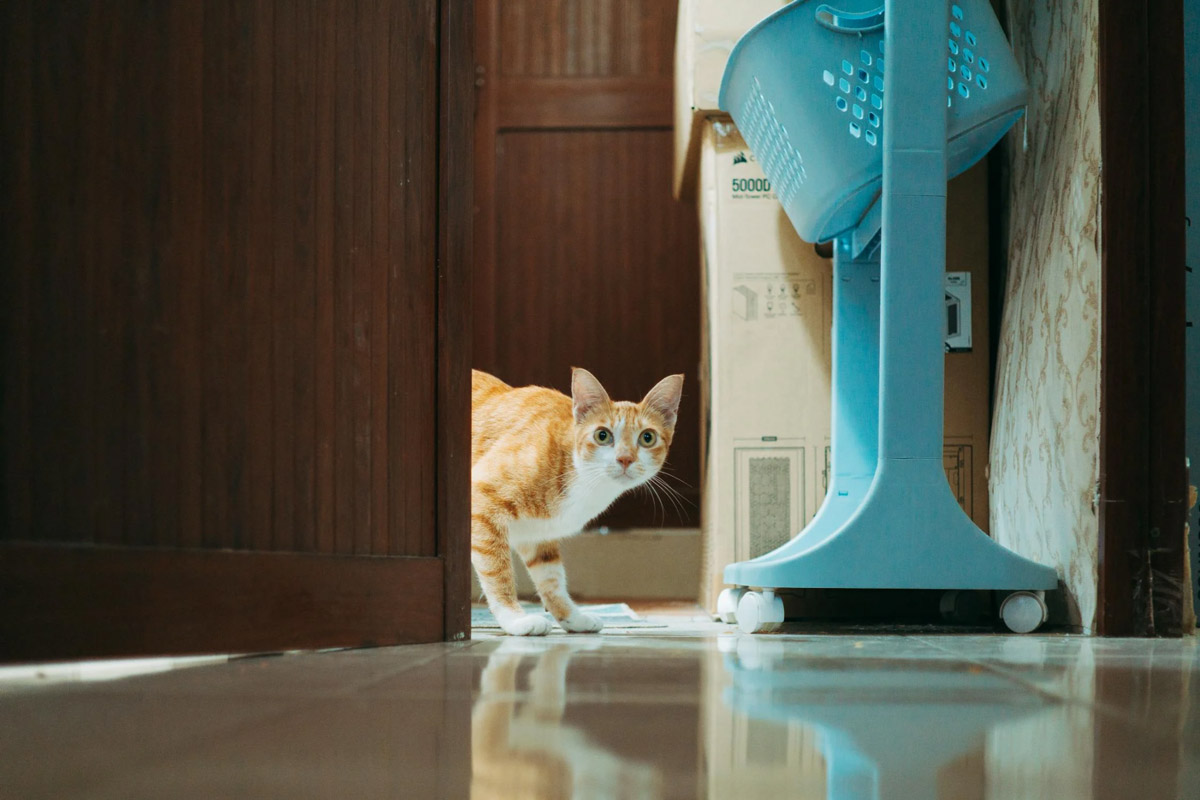Is Your Cat Scared of Strangers?: Causes and Practical Tips

Many cat owners have experienced the scenario where their usually affectionate and playful feline transforms into a nervous, elusive creature the moment a stranger enters the home. Understanding why cats are stressed out when around strangers and implementing strategies to alleviate their anxiety can foster a more harmonious household for both pets and people.
This article delves into the reasons behind this common feline behaviour and provides practical tips for helping your cat feel more at ease when guests arrive.
Reasons Behind Your Cat’s Fear of Strangers

Source: Pexels
- Evolutionary Instincts: Cats are both predators and prey in the wild. Their survival depends on their ability to be cautious and aware of their surroundings. A new person in their environment is an unknown variable, potentially perceived as a threat, triggering their instinct to hide or be wary.
- Lack of Socialisation: Kittens that are not exposed to a variety of people during their critical socialisation period may grow up to be more fearful of strangers. If your cat was not well-socialised as a kitten, they might find new people intimidating.
- Previous Negative Experiences: A past traumatic or stressful experience involving a stranger can cause lasting fear. Even if your cat has generally had positive interactions, a single negative encounter can lead to apprehension.
- Territorial Behavior: Cats are territorial animals. The presence of an unfamiliar person in their territory can be perceived as an invasion, causing stress and fear. This reaction is particularly common in cats that are highly territorial or have not been exposed to environmental changes.
- Sensitive Sensory Perception: Cats have heightened senses, and unfamiliar scents, sounds, and movements associated with new people can be overwhelming. A stranger’s perfume, loud voice, or even the way they move can be distressing to a cat.
Strategies to Help Your Cat Feel More Comfortable

Source: Pexels
- Create a Safe Space: Provide a designated safe area where your cat can retreat when visitors come over. This space should be equipped with their favourite toys, a cosy bed, food, water, and a litter box. Ensure that it is a quiet and secluded area, free from disturbances.
- Gradual Exposure: Introduce your cat to new people gradually. Start with one calm and quiet visitor who can sit still and avoid direct eye contact with the cat. Allow your cat to approach at their own pace. Over time, you can increase the number and variety of visitors.
- Positive Reinforcement: Use treats and praise to create positive associations with strangers. Reward your cat for any brave behaviour, such as approaching a visitor or remaining calm in their presence. This can help shift their perception of visitors from threatening to rewarding.
- Maintain Routine: Cats thrive on routine. Try to keep feeding, playtime, and other daily activities consistent, even when guests are present. Familiarity in other aspects of their life can provide comfort amidst the change.
- Desensitisation Techniques: Gradually desensitise your cat to the presence of strangers. Start by having visitors come over for short periods, staying calm and quiet. Slowly increase the duration and activity level of these visits as your cat becomes more comfortable.
- Use of Pheromones: Some products release synthetic feline pheromones, which can have a calming effect on cats. These can be particularly useful in reducing stress and promoting a sense of security when strangers are present.
- Interactive Play and Distraction: Engage your cat in their favourite games and activities during visits. Interactive toys, puzzle feeders, and laser pointers can distract them from their anxiety and help them associate visitors with fun and playtime.
- Respect Their Space: Ensure that visitors understand and respect your cat’s need for space. Discourage guests from pursuing or trying to pet the cat if they seem fearful. Allow your cat to initiate any interaction.
- Behavioural Therapy: In cases where fear of strangers is severe, consulting a professional animal behaviourist may be beneficial. They can develop a tailored behaviour modification plan to address your cat’s anxieties.
- Veterinary Consultation: If your cat’s fear seems extreme or is accompanied by other behavioural changes, a visit to the veterinarian is recommended. They can rule out any underlying health issues that may be contributing to your cat’s anxiety and discuss the potential use of anti-anxiety medications if necessary.
Building Trust and Confidence

Source: Pexels
Building your cat’s trust and confidence is a gradual process that requires patience and understanding. By creating a secure environment and using positive reinforcement techniques, you can help your feline friend feel more at ease with visitors.
Remember, each cat is unique, and what works for one might not work for another. Pay close attention to your cat’s body language and responses, and be willing to adjust your approach as needed.
Minimise Your Cat’s Anxiety Around Visitors

Source: Pexels
A cat’s fear of strangers is rooted in their natural instincts, past experiences, and sensitivity to changes in their environment. While it can be challenging to manage, understanding the reasons behind this behaviour and implementing strategies to reduce anxiety can make a significant difference. With time, patience, and the right approach, you can help your cat become more comfortable and confident, even in the presence of new people. This not only improves the well-being of your cat but also enhances the experience for your visitors, leading to a more peaceful and enjoyable home environment for everyone involved.
Join Clubpets at our cat event in Singapore for a day filled with fun and excitement! With a diverse assortment of games and informative workshops, there is no shortage of activities for you and your furry friends to join in on.








